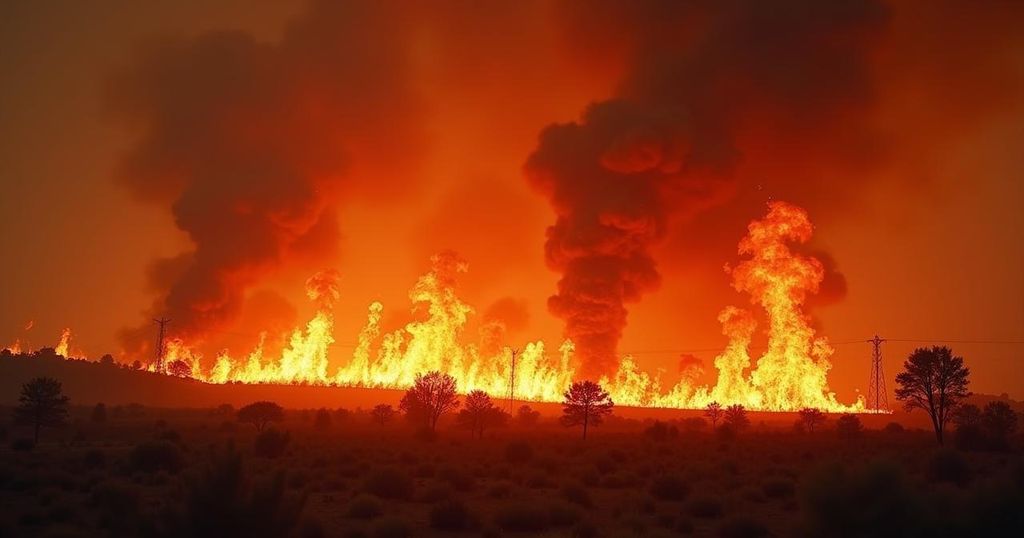The Escalating Threat of Wildfires: Impacts and Implications Under Climate Change

Wildfires are increasingly severe due to climate change, contributing to carbon emissions and health risks. A recent study by Fudan University reveals that around 3%-4% of land globally burns annually, with high-latitude areas experiencing intensified fire activity. The research emphasizes global collaboration for effective management strategies to address these pressing challenges.
Wildfires are increasingly becoming a global crisis, propelled by the adverse effects of climate change, which intensifies drought conditions and raises temperatures. These events have alarming repercussions, significantly contributing to carbon emissions and particulate matter (PM2.5), thereby impacting both public health and climate stability. While certain regions have seen a reduction in the areas affected by wildfires, high-latitude zones are encountering more extreme wildfire outbreaks. To address these growing challenges effectively, there is an urgent need for comprehensive research aimed at understanding and mitigating the detrimental impacts of wildfires. In a pivotal study conducted by researchers at Fudan University and published on July 19, 2024, in the journal Frontiers of Environmental Science & Engineering, the team explores global wildfire trends over the last twenty years. The research focuses on crucial data concerning burned areas, carbon dioxide (CO2) emissions, and PM2.5 concentrations worldwide, emphasizing the necessity to confront the rising dangers posed by wildfires, particularly in high-latitude settings where climate change has markedly amplified fire activity. The investigation reveals that approximately 3% to 4% of land globally is consumed by wildfires each year, leading to substantial releases of greenhouse gases and other pollutants. Despite a general decline in burned areas worldwide, especially in Africa, regions in Asia and North America situated at higher latitudes are experiencing an increase in both variability and severe instances of wildfires in recent periods. The research identifies climate change as the principal driver influencing these trends, especially in more northern latitudes. These wildfires are major contributors to CO2 and PM2.5 emissions, exacerbating climate change and presenting considerable health threats, particularly in areas with inadequate management systems. The study calls for focused research and effective fire management strategies to alleviate the impacts of wildfires. Dr. Hongliang Zhang, a prominent researcher associated with the study, articulated the findings by stating, “Our findings underscore the urgent need for global collaboration to combat the rising threat of wildfires. The variability in wildfire activity across continents reflects the complex interactions between climate change, vegetation, and human factors. By focusing on high-risk areas and improving fire management practices, we can reduce the severe health and environmental impacts of these fires.” This statement from Dr. Zhang highlights the critical significance of targeted efforts in managing and mitigating wildfire risks. The outcomes of this study hold substantial implications for the formulation of future wildfire management strategies. By pinpointing the pivotal factors underlying wildfire activity alongside their health ramifications, the research establishes a robust foundation for crafting more effective policies and practices. These insights are essential for policymakers, environmental agencies, and public health organizations in devising and implementing strategies to diminish wildfire hazards and enhance resilience in susceptible regions. Furthermore, the study underscores the continuous requirement for further research to adapt to the dynamic challenges presented by climate-driven wildfires.
The frequency and intensity of wildfires are escalating globally, largely due to the impacts of climate change, which exacerbate environmental conditions conducive to such fires. Regions that were once less affected are experiencing more severe wildfire incidents, particularly high-latitude areas. Understanding the implications of wildfires on climate and human health is vital, as these events contribute significantly to greenhouse gas emissions and pose serious public health risks. Research studies are critical in developing effective management strategies to address these growing threats.
In summary, the research conducted by Fudan University highlights the alarming rise in wildfire incidents globally, particularly in high-latitude regions due to climate change. It calls for urgent attention to the significant health and environmental impacts of wildfires, along with a collaborative approach to improve management practices. Addressing the challenges posed by wildfires necessitates further research and the development of informed strategies to enhance resilience and mitigate risks in vulnerable areas.
Original Source: www.eurekalert.org








